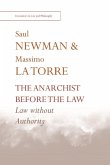Emmanuel Levinas's philosophy of ethics has frequently attracted attention amongst legal scholars, but he remains a divisive and often enigmatic contributor to this field. He has been read within contexts as varied as human rights, private law, refugee law, and on the nature of judicial reasoning. This book explores what unites such apparently diverse applications of his ideas, and in doing so considers the challenge of law's ethical relationship with the other. In addition to asking how Levinas's ethics can inform legal problems, the book also examines how the modern legal edifice has a deceptive tendency to close itself off from the ethical experience. In particular, literatures on biopolitics suggest that law is increasingly complicit in reductive determinations of how we understand ourselves and others. Levinas's most penetrating insight might not, therefore, lie in the law's instrumentalisation of his ethics, but instead in the way his ethics trace a human encounter that escapes law.
Dieser Download kann aus rechtlichen Gründen nur mit Rechnungsadresse in A, B, BG, CY, CZ, D, DK, EW, E, FIN, F, GR, HR, H, IRL, I, LT, L, LR, M, NL, PL, P, R, S, SLO, SK ausgeliefert werden.









